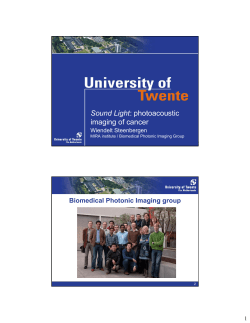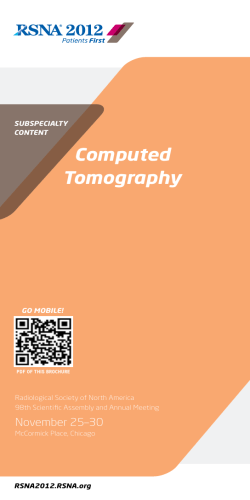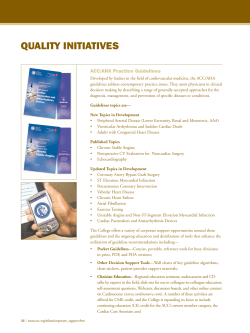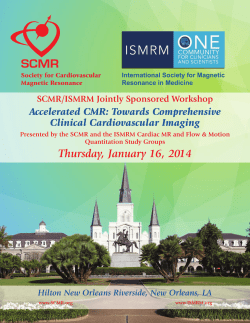
Curriculum Vitae Linwei WANG
Linwei WANG Curriculum Vitae NAME ADDRESS Linwei WANG TITLE and POSITION 74-‐‑1075, PhD Program B. Thomas Golisano College of Computing & Information Sciences Rochester Institute of Technology Rochester, NY 14623 CONTACT INFORMATION Assistant Professor Tel: (585) 475-‐‑4238 Email: [email protected] Homepage: http://phd.gccis.rit.edu/linweiwang Professional Experience 08/2009 – present Assistant Professor, Ph.D. Program of Computing and Information Sciences Director, Computational Biomedicine Laboratory (CBL) Rochester Institute of Technology, Rochester, NY, USA The research focus of the CBL is two-‐‑fold. On one hand, we develop theoretical, algorithmic, and computational infrastructure to support the integration of physics-‐‑based computer modeling and data-‐‑driven learning for the investigation of individualized systems. On the other hand, we apply these methods to various areas, primarily computational physiology, biomedical signal and image analysis, cardiovascular imaging, and cardiac electrophysiology. 08/2007-‐‑05/2009 Research Assistant, Rochester Institute of Technology 08/2005-‐‑05/2007 Research Assistant, Hong Kong University of Science and Technology 08/2005-‐‑05/2007 Teaching Assistant, Hong Kong University of Science and Technology Education 2007 -‐‑ 2009 PhD, Computing and Information Science, Rochester Institute of Technology, Rochester, NY, USA Dissertation: Personalized Noninvasive Imaging of Volumetric Cardiac Electrophysiology 2005 -‐‑ 2007 MPhil, Electronic and Computer Engineering, Hong Kong University of Science and Technology Thesis: Noninvasive Imaging of 3D Cardiac Electrophysiology GPA: A+ (11.80/12.0) 2001 -‐‑ 2005 BE, Optic-‐‑Electronic Information Engineering, Zhejiang University, China Major GPA: 3.90/4.0 (Top 1/158 of 2005 class) Advanced Class of Engineering Education GPA: 3.89/4.0 1 5/6/14 Linwei WANG Honors and Awards 2014 CAREER Award, National Science Foundation 2014 ISBI Best Paper Award (first-‐‑authored by my doctoral advisee) 2012 GCCIS Featured Faculty for Faculty Scholarship, RIT 2011 Best Paper Award, MICCAI –STACOM EP Simulation Challenge 2006 UGC Research Travel Grant, Hong Kong University of Science & Technology 2005 Zhu Kezhen Scholarship, Zhejiang University (Representing the highest academic honor at Zhejiang University, 12 out of 20,000+ undergraduate students were awarded with this scholarship in 2005). 2004 Bank of Xingye Scholarship, Zhejiang, China 2004 Second Place, National Mechanical Design Competition, China 2004 First Place & Best Appearance Award, Zhejiang University Mechanical Design Competition 2004 Second Place, International Mathematical Contest in Modeling (IMCM) 2003 First Place, Chinese National Mathematical Modeling Contest (CMCM) 2003 Shunyu Cooperation Scholarship, China 2003-‐‑2004 First-‐‑Class Scholarship, Zhejiang University 2002-‐‑2005 Honor Student (First Class), Zhejiang University 2002 Second-‐‑Class Scholarship, Zhejiang University 2001 First-‐‑Class Freshman Scholarship, Zhejiang University Sponsored Research Current NSF CAREER Award PI Wang 06/01/2014 – 05/31/2019 $446,143 CAREER: Integrating Physical Models into Data-‐‑Driven Inference Sponsor: National Science Foundation (NSF) Role: PI My career goal is to develop new methodologies for improving the individualized assessment of high-‐‑dimensional nonlinear dynamic systems by enabling the integration of complex domain knowledge – yielded by computer simulation using physical models – into the process of data-‐‑driven inference and learning. SUTD-‐‑ZJU Research Collaboration Grant PI Yeung 08/01/2012-‐‑07/31/2015 S$331,200 Accurate Hemodynamic Data Assimilation with MRA/CBV Imaging Sponsor: Singapore University of Technology and Design (SUTD) Role: ZJU Collaborator This project aims to exploit the actual resting blood volume fraction (BVF) in hemodynamic assimilation procedure. RIT GCCIS Kodak Endowed Chair Fund PI Wang 01/27/2014-‐‑12/10/2014 $43,000 Sensor Fusion for Cognitive Load and Stress Monitoring and Detection Sponsor: Golisano College of Computing and Information Sciences (GCCIS), RIT Role: PI This project aims to develop a personal health system to enable continuous monitoring of cognitive load and early detection of stress through fusion of multi-‐‑modal sensor data. 2 5/6/14 Linwei WANG Completed NSFC Young Researcher Funding PI Zhang 01/01/2011-‐‑12/30/2013 RMB210,000 Study of Three-‐‑Dimensional Noninvasive Dynamic Imaging of Cardiac Electrophysiology Sponsor: National Science Foundation China (NSFC) Role: Co-‐‑investigator This project investigates noninvasive imaging of electrophysiological activity using structural imaging data. Professional Services Grant Reviewer 2014 National Science Foundation (NSF) Review Panel 2014 National Institutes of Health (NIH) Special Emphasis Panel ZRG1 SIBI-‐‑L (83) A 2013-‐‑present American Heart Association Radiology & Imaging Clinical Review Panel 2013 National Institutes of Health (NIH) BMIT-‐‑B Study Section Journal Editor 2012-‐‑2014 Lead Guest Editor, Special Issue in Computational and Mathematical Methods in Medicine, Hindawi 2014 Editorial Reviewer Board, International Journal of Diagnostic Imaging, Sciedu Press Conference Chair 2014 Special Session Co-‐‑Chair, ISBI, April 2014, Beijing, China 2012 Organization Committee Co-‐‑Chair, Upstate New York Cardiac Electrophysiological Society 2012 Special Session Co-‐‑Chair, ISBI, May 2012, Barcelona, Spain. 2011 Scientific Session Co-‐‑Chair, CinC 2011, Beijing, China. Journal & Conference Reviewer 2014 Computers in Biology and Medicine, Elsevier 2014 Medical Image Computing and Computer Assisted Intervention (MICCAI) 2014 IEEE International Symposium on Biomedical Imaging (ISBI) 2014 Computer Vision and Pattern Recognition (CVPR) 2013 Computer Vision and Imaging Understanding, Elsevier 2013 PLOS ONE 2013 IEEE International Symposium on Biomedical Imaging (ISBI) 2012 IEEE Transactions on Medical Imaging, IEEE 2011 American Journal of Physiology – Heart and Circulation Physiology 2011 IEEE Transactions on Biomedical Engineering, IEEE 2010 Annals of Biomedical Engineering, Springer 2010 Medical Image Computing and Computer Assisted Intervention (MICCAI) 2009 Mathematics and Computers in Simulation, Elsevier 2009 Medical Imaging and Augmented Reality (MIAR) 2008 Medical Image Computing and Computer Assisted Intervention (MICCAI) 3 5/6/14 Linwei WANG Member 2006-‐‑present Institute of Electrical and Electronics Engineering (IEEE) 2012-‐‑present American Heart Association (AHA) Plenary and Invited Talks 2014 Panelist for Creating a Three Year Scholarship Plan, GCCIS-‐‑NTID 2013 Shenzhen Institute of Advanced Technology, Shenzhen, China Transmural Imaging of Ventricular Action Potential and Post-‐‑Infarction Scars 2012 Northeastern University, Boston, MA Noninvasive Tranmsural Electrophysiological Imaging 2012 EP Department, University of Rochester Medical Center Noninvasive Tranmsural Electrophysiological Imaging 2011 Closing plenary talk, Computing in Cardiology, Hangzhou, China, Mapping the Transmural Scar and Activation for Patients with Ventricular Arrhythmia 2010 Upstate New York Cardiac Electrophysiology Society (UNYCES), Utica, NY How Much Geometrical Detail Do We Need in Computational Electrophysiological Imaging? 2010 Center for Advanced Radiotherapy Technologies (CART), University of California San Diego Personalized Noninvasive Imaging of 3D Volumetric Cardiac Electrophysiology 2009 Upstate New York Cardiac Electrophysiology Society (UNYCES), Ithaca, NY Noninvasive Volumetric Cardiac Electrophysiological Imaging in Infarct Imaging and Quantification Department and Institute Committee 2014-‐‑present Institute Academic Support and Student Affairs 2014-‐‑present Chair, GCCIS FEAD Committee 2013-‐‑present Member, GCCIS Governance Committee 2013-‐‑present Member, GCCIS Evaluating Teaching Effectiveness Committee 2013 Member, GCCIS PhD Program Senior Staff Specialist Search Committee 2012-‐‑2013 Member, GCCIS FEAD Committee 2012-‐‑present Member, GCCIS Outstanding Scholar Committee 2012-‐‑present Member, PhD Program Admission Committee 2012-‐‑2013 Member, GCCIS Trustees Scholarship Award Committee 2012-‐‑2013 Member, GCCIS College Strategic Plan Committee 2010-‐‑2012 Chair, GCCIS PhD Program Admission Committee 2009-‐‑2011 Member, GCCIS Visiting Scholar Committee 2009-‐‑2010 Member, GCCIS PhD Program Admission Committee Teaching 2014-‐‑present CSCI-‐‑530: Introduction to Computer Graphics (Computer Science Undergraduate Elective) 2014-‐‑present CISC-‐‑862: Computational Modeling and Simulation (PhD Elective, previously 4040-‐‑849) 2013-‐‑present CISC-‐‑820: Quantitative Foundation (PhD Core, Previously 4040-‐‑820-‐‑01) 2013 4003-‐‑570/4005-‐‑761: Computer Graphics I (Computer Science Undergraduate & Graduate Elective) 2010-‐‑2013 4040-‐‑820-‐‑01: Discovery (PhD Core) 2009-‐‑2013 4040-‐‑849: Computational Modeling and Simulation of Complex Systems (PhD Elective) 4 5/6/14 Linwei WANG 2010-‐‑2012 4005-‐‑759-‐‑01: Topics in Artificial Intelligence (Computer Science Elective). 2009-‐‑2010 4040-‐‑811: Introduction to Research (PhD Core) Mentoring Doctoral Student Advising -‐‑ Primary 2010-‐‑present Azar Rhahimi, GCCIS PhD 2011-‐‑present Jingjia Xu, GCCIS PhD Doctoral Student Advising -‐‑ Secondary 2009-‐‑present Hongda Mao, GCCIS PhD 2009-‐‑2012 Mohamed Elshrif, GCCIS PhD Doctoral Student Advising -‐‑ Dissertation Committee 2013-‐‑present Lei Hu, GCCIS PhD, proposal defended in 10/2013 Dissertation: Structured Learning Applied to Recognition of Handwritten Math Expressions 2012-‐‑present Erika Mesh, GCCIS PhD Dissertation: Risk Analysis of Scientific Software Projects via SE Process Modeling and Simulation 2011-‐‑present Biru Cui, GCCIS PhD Dissertation: Novel Events Adoption Modeling and Prediction 2009-‐‑present Hongda Mao, GCCIS PhD, proposal defended in 02/2012 Dissertation: Integrated Cardiac Electromechanical Modeling and Personalization 2012-‐‑2013 Raymond Ptucha, GCCIS PhD, dissertation defended in 2013 Dissertation: Human Facial Expression Recognition in Natural Conditions 2011 Bogdan Mitrea, Pharmacology PhD, SUNY Upstate Medical University, Syracuse, NY, 04/2011 Dissertation: 3D Optical Mapping of Cardiac Excitation: From Focal Sources to Scroll Waves Master Student Advising – Primary 2013-‐‑present Balayi Iyer, Computer Science 2013-‐‑present Fnu Sairamesh Krithika, Computer Science Master Student Advising – Secondary 2010-‐‑2012 Martin Corraine, Computer Engineering, Rochester Institute of Technology, 05/2012 Thesis: Analysis of Using GPU to Accelerate Transmural Electrophysiological Imaging Undergraduate Students Advising 2013 Karna Priya, Biomedical Science (Summer Research Intern) 2013 Robin Lee, Biochemistry (McNair Scholar) 2009-‐‑2010 Brian Call, Devin Lane, Peter Lavellee, Brad Pease, and Richard Stack, Software Engineering Capstone Project: Development of a Computational Platform for the Modeling and Simulation of Cardiac Physiology and Pathophysiology” 5 5/6/14 Linwei WANG Other Mentoring Activities 2012-‐‑present Mentor for Pittsford High School Career Internship Program Publications The fundamental role of conferences in computing publication is underlined with strength in the Best Practices Memo published by the US Computing Research Association (http://cra.org/resources/bp-view/evaluating_computer_scientists_and_engineers_for_promotion_and_tenure/). A distinctive feature of computer science publication culture is the importance of prestigious conferences as a favorite tool for presenting original research (Meyer et al, Communications of the ACM 2009). For instance, the Medical Image Computing and Computer-Assisted Intervention (MICCAI) accepts full-length, 8-page manuscripts after double-blinded peer-review process by 3-5 experts in the field and the accepted manuscripts are published in the Springer Lecture Notes in Computer Science. The Computer Vision and Pattern Recognition (CVPR) accepts full-length 8-page manuscripts in standard IEEE format peer reviewed in a double-blinded and the acceptance rate hovers around 25%. Peer-‐‑Reviewed Journal Articles 1. Jingjia Xu, Azar Rahimi, Fei Gao, and Linwei Wang, Noninvasive Transmural Electrophysiological Imaging Based on Minimization of Total-‐‑Variation Functional, IEEE Transactions on Medical Imaging, under minor revision, 2014. 2. Azar Rahimi, Jingjia Xu, and Linwei Wang, Lp-‐‑Norm Regularization in Volumetric Imaging of Cardiac Current Sources, Computational and Mathematical Methods in Medicine, Hindawi, 2013: 276478, doi:10.1155/2013/276478. 3. Linwei Wang, Fady Dawoud, Sai-‐‑Kit Yeung, Pengcheng Shi, Ken C.L. Wong, and Albert C. Lardo, Transmural Imaging of Ventricular Action Potentials and Post-‐‑Infarction Scars in Swine Hearts, IEEE Transactions on Medical Imaging, 32(4): 731-‐‑747, 2013. 4. Linwei Wang, Computational Reduction for Noninvasive Transmural Electrophysiological Imaging, Computers in Biology and Medicine, Elsevier, 3(3): 184-‐‑199, 2013. 5. *Oscar Camara, *Maxime Sermesant, *Pablo Lamata, *Linwei Wang, Mihaela Pop, Jatin Relan, Mathieu De Craene, Herve. Delingette, Huafeng Liu, Steven Niederer, Ali Pashaei, Gernot Plank, Daniel Romero, Rafael Sebastián, Ken C.L. Wong, Heye Zhang, Nicholas Ayache, Alejandro Frangji, Pengcheng Shi, Nic Smith, and Graham Wright: Inter-‐‑ Model Consistency and Complementarity: Learning from ex-‐‑vivo Imaging and Electrophysiological Data towards an Integrated Understanding of Cardiac Physiology. Progress in Biophysics and Molecular Biology, Elsevier, 107: 122-‐‑133, 2011 (*equal contribution from the first four authors). 6. Linwei Wang, Ken C.L. Wong, Heye Zhang, Huafeng Liu, and Pengcheng Shi: Noninvasive Computational Imaging of Cardiac Electrophysiology for 3D Infarct Quantification, IEEE Transactions on Biomedical Engineering, 58(4): 1033-‐‑1043, 2011. 7. Ken C. L. Wong, Linwei Wang, Heye Zhang, Huafeng Liu, Pengcheng Shi: Physiological Fusion of Functional and Structural Images for Cardiac Deformation Recovery. IEEE Transactions on Medical Imaging, 30(4): 990-‐‑1000, 2011. 8. Linwei Wang, Heye Zhang, Ken C.L. Wong, and Pengcheng Shi: Physiological-‐‑Model-‐‑Constrained Noninvasive Reconstruction of Volumetric Myocardial Transmembrane Potentials, IEEE Transactions on Biomedical Engineering, 57(2): 296-‐‑315, 2010 (cover page). 9. Linwei Wang, Jijie Xu, Heye Zhang, Ken C.L. Wong, Huafeng Liu, and Pengcheng Shi: Nonintrusive Model-‐‑Based 6 5/6/14 Linwei WANG Force Estimation Using Visual-‐‑Tracking of Deformable Objects, International Journal of Computer Assisted Radiology and Surgery, Springer, 5(1): S153-‐‑S154, 2010. 10. 11. 12. Ken C.L. Wong, Linwei Wang, Heye Zhang, Huafeng Liu, and Pengcheng Shi: Meshfree Implementation of Individualized Active Cardiac Dynamics, Computerized Medical Imaging and Graphics, Elsevier, 34(1): 91-‐‑103, 2010. Linwei Wang, Heye Zhang, Ken C.L. Wong, and Pengcheng Shi: Electrocardiographic Simulation on Personalized Heart-‐‑Torso Structures Using Coupled Meshfree-‐‑BEM Platform, International Journal of Functional Informatics and Personalized Medicine, Inderscience, 2(2): 175-‐‑200, 2009. Ken C.L. Wong, Linwei Wang, Heye Zhang, Huafeng Liu, and Pengcheng Shi: Computational Complexity Reduction for Volumetric Cardiac Deformation Recovery, Journal of Signal Processing Systems, Springer, 55: 281-‐‑296, 2009. Peer-‐‑Reviewed Conference Papers 13. Azar Rahimi, Jingjia Xu, and Linwei Wang, Hierarchical Multiple-‐‑Model Bayesian Approach to Transmural Electrophysiological Imaging, Medical Image Computing and Computer-‐‑Assisted Intervention (MICCAI), Boston, USA, September 2014, Lecture Notes in Computer Science, Springer, accepted. 14. Jingjia Xu, Azar Rahimi, Fei Gao, and Linwei Wang, Variational Bayesian Electrophysiological Imaging of Myocardial Infarction, Medical Image Computing and Computer-‐‑Assisted Intervention (MICCAI), Boston, USA, September 2014, Lecture Notes in Computer Science, Springer, accepted. 15. **Jingjia Xu, Azar Rahimi, Fei Gao, and Linwei Wang, Total-‐‑Variation Minimization on Unstructured Volumetric Mesh: Biophysical Application on Reconstruction of 3D Ischemic Myocardium. IEEE Conference on Computer Vision and Pattern Recognition (CVPR), Columbus, USA, June 2014, in press. 16. Azar Rahimi, Jingjia Xu, and Linwei Wang, Electrophysiological Imaging of Voluemtric Infarct Border Using a Spatio-‐‑ Temporal Lp-‐‑Norm Constraint, IEEE International Symposium on Biomedical Imaging (ISBI), Beijing, China, May 2014, in press (best paper travel award). 17. Hongda Mao, Megan Gribble, Arkady Pertsov, Linwei Wang, and Pengcheng Shi, Understanding Embroyonic Heart Morphogenesis Through Automatic Segmentation and Confocal Imaging with Optimal Clearing, IEEE International Symposium on Biomedical Imaging (ISBI), Beijing, China, May 2014, in press. 18. Jingjia Xu, Azar Rahimi, Fei Gao, and Linwei Wang, A Novel Total Variation Based Noninvasive Transmural Electrophysiological Imaging. In Kensaku Mori, Ichiro Sakuma, Yoshinobu Sato, Christian Barillot, and Nassir Navab (Eds), Medical Image Computing and Computer-‐‑Assisted Intervention (MICCAI), Nagoya, Japan, September 2013, Lecture Notes in Computer Science, Springer, 8149: 501-‐‑508, 2013. 19. Azar Rahimi and Linwei Wang, The Impact of Ventricular Shape Variations on Inverse Electrocardiography: A Feasibility Study. IEEE International Symposium on Biomedical Imaging (ISBI), San Francisco, USA, April 2013, pp 564-‐‑567 (oral presentation). 20. Azar Rahimi, Jingjia Xu, John R Fitz-‐‑Clarke, and Linwei Wang, Volumetric Imaging of Cardiac Current Source using Lp-‐‑Norm Regularization, Computing in Cardiology (CinC), Zaragoza, Spain, September 2013, pp 715-‐‑718. 21. Jingjia Xu, Azar Rahimi, and Linwei Wang: Localization of Transmural Sparse Excitation Stimuli from Surface 7 5/6/14 Linwei WANG Mapping, In Nicholas Ayache, Herve Delingette, Polina Golland, and Kensaku Mori (Eds), Medical Image Computing and Computer-‐‑Assisted Intervention (MICCAI), Nice, France, September 2012, Lecture Notes in Computer Science, Springer, 7510: 675-‐‑682, 2012. 22. 23. 24. 25. 26. 27. 28. 29. 30. 31. 32. Ken C.L. Wong, Jatin Relan, Linwei Wang, Maxime Sermesant, Herve Delingette, Nicholas Ayache, Pengcheng Shi: Strain-‐‑Based Regional Nonlinear Cardiac Material Properties Estimation from Medical Images, In Nicholas Ayache, Herve Delingette, Polina Golland, and Kensaku Mori (Eds), Medical Image Computing and Computer-‐‑Assisted Intervention (MICCAI), Nice, France, September 2012, Lecture Notes in Computer Science, Springer, 7510: 617-‐‑624, 2012. Hongda Mao, Linwei Wang, Ken C.L Wong, Huafeng Liu and Pengcheng Shi: Towards Integrated Noninvasive Personalization of Cardiac Electromechanics. IEEE International Symposium on Biomedical Imaging (ISBI), Barcelona, Spain, May 2012, pp 1430-‐‑1433. Azar Rahimi, Jingjia Xu and Linwei Wang: Impact of Local Variations in Ventricular Anatomical Models on Transmural Electrophysiological Imaging. Computing in Cardiology (CinC), Krakow, Poland, September 2012, pp 957-‐‑960. Martin Corraine, Sonia Lopez, and Linwei Wang: GPU Accelerations of Transmural Electrophysiological Imaging. Computing in Cardiology (CinC), Krakow, Poland, September 2012, pp 849-‐‑952. Linwei Wang and Fady Dawoud: Transmural Imaging of Ventricular Action Potentials and Post-‐‑Infarct Substrates in Porcine Hearts. Computing in Cardiology (CinC), Krakow, Poland, September 2012, pp 749-‐‑752. Linwei Wang, Fady Dawoud, Ken C.L. Wong, Heye Zhang, Huafeng Liu, Albert C. Lardo, and Pengcheng Shi: Transmural Electrophysiologic and Scar Imaging on Porcine Heart with Chronic Infarction, MICCAI Workshop on Statistical Atlases and Computational Models of the Heart: Imaging and Modeling Challenges (MICCAI-‐‑STACOM), Toronto, Canada, September 2011, Lecture Notes in Computer Science, 7085: 23-‐‑32, 2012 (best paper award). Azar Rahimi, Hongda Mao, Pengcheng Shi, and Linwei Wang: Toward Clinically-‐‑Feasible Noninvasive Electrophysiological Imaging: Investigating the Impact of Local Anatomical Detail, MICCAI Workshop on Statistical Atlases and Computational Models of the Heart (MICCAI-‐‑STACOM), Toronto, Canada, September 2011, Lecture Notes in Computer Science, 7085: 188-‐‑197, 2012. Hongda Mao, Linwei Wang, Ken C.L. Wong, Huafeng Liu, and Pengcheng Shi: Volumetric Modeling Electromechanics of the Heart, MICCAI Workshop on Statistical Atlases and Computational Models of the Heart (MICCAI-‐‑STACOM), Toronto, Canada, September 2011, Lecture Notes in Computer Science, 7085: 224-‐‑233, 2012. Ken C.L. Wong, Linwei Wang, Huafeng Liu, and Pengcheng Shi: A Comparative Study of Physiological Models on Cardiac Deformation Recovery: Effects of Biomechanical Constraints, In Gabor Fichtinger, Anne Martel, and Terry Peters (Eds), Medical Image Computing and Computer-‐‑Assisted Intervention (MICCAI), Toronto, Canada, September 2011, Lecture Notes in Computer Science, Springer, 6891: 420-‐‑427, 2011. Linwei Wang, Fady Dawoud, Ken C.L. Wong, Heye Zhang, Huafeng Liu, John Sapp, Milan Horacek, and Pengcheng Shi: Mapping the Transmural Scar and Activation for Patients with Ventricular Arrhythmia, Computing in Cardiology (CinC), Hangzhou, China, September 2011, pp 849-‐‑852 (closing plenary presentation). Hongda Mao, Linwei Wang, Ken C.L. Wong, Huafeng Liu, and Pengcheng Shi: A Coupled Heart-‐‑Torso Framework for Cardiac Electrocardiographic Simulation, Computing in Cardiology (CinC), Hangzhou, China, September 2011, pp 225-‐‑ 8 5/6/14 Linwei WANG 228 (oral presentation). 33. 34. 35. 36. 37. 38. 39. 40. 41. 42. 43. Mohamed Elshrif, Linwei Wang, and Pengcheng Shi: Dynamic Classification of Cellular Transmural Transmembrane Potential (TMP) Activity of the Heart, Functional Imaging and Modeling of the Heart (FIMH), New York City, NY, USA, May 2011, pp 36-‐‑46. **Ken C.L. Wong, Linwei Wang, Heye Zhang, and Pengcheng Shi: Physiological Fusion of Functional and Structural Data for Cardiac Deformation Recovery, In Tianzi Jiang, Nassir Navab, Josien P. W. Pluim, and Max A. Viergever (Eds), Medical Image Computing and Computer-‐‑Assisted Intervention (MICCAI), Beijing, China, October 2010, Lecture Notes in Computer Science, Springer, 6361: 159-‐‑166, 2010. Linwei Wang, Ken C.L. Wong, Heye Zhang, Huafeng Liu, and Pengcheng Shi: How Much Geometrical Detail Do We Need in Cardiac Electrophysiological Imaging? A Generic Heart-‐‑Torso Representation for Fast Subject-‐‑Specific Custmoziation, MICCAI Workshop on Statistical Atlases and Computational Models of the Heart (MICCAI-‐‑STACOM), Beijing, China, September 2010, Lecture Notes in Computer Science, 6364: 232-‐‑241, 2010. Linwei Wang, Ken C.L. Wong, Heye Zhang, Huafeng Liu, and Pengcheng Shi: A Statistical Physiological-‐‑Model-‐‑ Constrained Framework for Computational Imaging of Subject-‐‑Specific Volumetric Cardiac Electrophysiology Using Optical Imaging and MRI Data, MICCAI Workshop on Statistical Atlases and Computational Models of the Heart (MICCAI-‐‑ STACOM), Beijing, China, September 2010, Lecture Notes in Computer Science, 6364: 261-‐‑269 (oral presentation). Jijie Xu, Linwei Wang, Ken C.L. Wong, and Pengcheng Shi: A Meshless Framework for Bevel-‐‑Tip Flexible Needle Insertion Through Soft Tissue, IEEE/RAS-‐‑EMBS International Conference on Biomedical Robotics and Biomechatronics (IEEE BioRob), Tokyo, Japan, September 2010, pp 753-‐‑758 (oral presentation). Ken C.L. Wong, Linwei Wang, Heye Zhang, and Pengcheng Shi: Computational Complexity Reduction Via Model Superposition: Application to Biomechanics-‐‑Based Nonlinear Cardiac Deformation Recovery, IEEE International Conference on Image Processing (ICIP), Hong Kong, China, September 2010, pp 4417-‐‑4420. Linwei Wang, Heye Zhang, Ken C.L. Wong, Huafeng Liu, and Pengcheng Shi:Noninvasive Imaging of Electrophysiological Substrates in Post Myocardial Infarction, In Guang-‐‑Zhong Yang, David Hawkes, Daniel Rueckert, Alison Noble, and Chris Taylor (Eds), Medical Image Computing and Computer-‐‑Assisted Intervention (MICCAI), London, UK, September 2009, Lecture Notes in Computer Science, Springer, 5762: 732-‐‑740, 2009. Linwei Wang, Heye Zhang, Ken C.L. Wong, Huafeng Liu, and Pengcheng Shi: Noninvasive Volumetric Imaging of Cardiac Electrophysiology, IEEE Conference on Computer Vision and Pattern Recognition (CVPR), Miami, US, June 2009, pp 2176-‐‑2183. Ken C.L. Wong, Linwei Wang, Heye Zhang, and Pengcheng Shi: Nonlinear Cardiac Deformation Recovery from Medical Images, IEEE International Conference on Image Processing (ICIP), Cairo, Egypt, November 2009, pp 2513-‐‑ 2516. Linwei Wang, Ken C.L. Wong, Heye Zhang, and Pengcheng Shi: Electrocardiographic Simulation on Coupled Meshfree-‐‑ BEM Platform, Functional Imaging and Modeling of the Heart (FIMH), Nice, France, June 2009, pp 162-‐‑171. Ken C.L. Wong, Linwei Wang, and Pengcheng Shi: Active Model with Orthotropic Hyperelastic Material for Cardiac Image Analysis, Functional Imaging and Modeling of the Heart (FIMH), Nice, France, June 2009, pp 229-‐‑238. 9 5/6/14 Linwei WANG 44. 45. 46. 47. 48. 49. 50. 51. 52. 53. 54. 55. 56. Linwei Wang, Heye Zhang, Ken C.L. Wong, and Pengcheng Shi: A Reduced-‐‑Rank Square Root Filtering Framework for Noninvasive Functional Imaging of Volumetric Cardiac Electrical Activity, IEEE International Conference on Acoustics, Speech and Signal Processing (ICASSP), Taipei, China, April 2009, pp 533-‐‑536. Linwei Wang, Ken C.L. Wong, Heye Zhang, and Pengcheng Shi: Noninvasive Functional Imaging of Volumetric Cardiac Electrical Activity: A Human Study on Myocardial Infarction, In Dimitris Metaxas, Leon Axel, Gabor Fichtinger, and Gabor Szekely (Eds), Medical Image Computing and Computer-‐‑Assisted Intervention (MICCAI), New York City, US, September 2008, Lecture Notes in Computer Science, Springer, 5241: 1042-‐‑1050, 2008. Linwei Wang, Ken C.L. Wong, and Pengcheng Shi: Dynamic Structural-‐‑Image-‐‑Guided Noninvasive 3D Cardiac Electrophysiological Mapping, IEEE International Conference on Image Processing (ICIP), San Diego, USA, October 2008, pp 1428-‐‑1431. Linwei Wang, Heye Zhang, Ken C.L. Wong, and Pengcheng Shi: Coupled Meshfree-‐‑BEM Platform for Electrocardiographic Simulation: Modeling and Validations, Medical Imaging and Augmented Reality (MIAR), Tokyo, Japan, August 2008, pp 98-‐‑107. Ken C.L. Wong, Linwei Wang, Heye Zhang, Huafeng Liu, and Pengcheng Shi: Simulation of Active Cardiac Electromechanical Dynamics, Medical Imaging and Augmented Reality (MIAR), Tokyo, Japan, August 2008, pp 60-‐‑69. Heye Zhang, Linwei Wang, Peter J. Hunter, and Pengcheng Shi: Meshfree Framework for Image-‐‑Derived Modeling, IEEE International Symposium on Biomedical Imaging (ISBI), Paris, France, April 2008, pp 1449-‐‑1452. Ken C.L. Wong, Linwei Wang, Heye Zhang, Huafeng Liu, and Pengcheng Shi: Integrating Functional and Structural Images for Simultaneous Cardiac Segmentation and Deformation Recovery,In Nicholas Ayache, Sebastien Ourselin, and Anthony Maeder (Eds), Medical Image Computing and Computer-‐‑Assisted Intervention (MICCAI), Brisbane, Australia, October 2007, Lecture Notes in Computer Science, Springer, 4791: 270-‐‑277, 2007. Zhenghui Hu, Heye Zhang, Linwei Wang, Xiaolan Song, and Pengcheng Shi: Joint Estimation for Nonlinear Dynamic System from FMRI Time Series, IEEE International Conference on Image Processing (ICIP), San Antonio, USA, September 2007, pp 145-‐‑148. Linwei Wang, Heye Zhang, and Pengcheng Shi: Toward Noninvasive 3D Imaging of Cardiac Arrhythmias, Functional Imaging and Modeling of the Heart (FIMH), Salt Lake City, USA, June 2007, pp 280-‐‑289. Heye Zhang, Linwei Wang, and Pengcheng Shi: Simulation of Cardiac Electrophysiological Activities Using a Heart-‐‑ Torso Model, Functional Imaging and Modeling of the Heart (FIMH), Salt Lake City, USA, June 2007, pp 150-‐‑159. Linwei Wang, Heye Zhang, Ken C.L. Wong, and Pengcheng Shi: Noninvasive Imaging of 3D Cardiac Electrophysiology, IEEE International Symposium on Biomedical Imaging: Macro to Nano (ISBI), Washington DC, USA, April 2007, pp 632-‐‑635 (invited talk). Linwei Wang, Heye Zhang, and Pengcheng Shi: Simultaneous Recovery of Three-‐‑dimensional Myocardial Conductivity and Electrophysiological Dynamics: A Nonlinear System Approach, Computers in Cardiology (CinC), Valencia, Spain, September 2006, pp 45-‐‑48. Linwei Wang, Heye Zhang, Huafeng Liu, and Pengcheng Shi: Imaging of 3D Cardiac Electrical Activity: A Model-‐‑based Recovery Framework, In Rasmus Larsen, Mads Nielsen, and Jon Sporring (Eds), Medical Image Computing and 10 5/6/14 Linwei WANG Computer-‐‑Assisted Intervention (MICCAI), Copenhagen, Denmark, October, 2006, Lecture Notes in Computer Science, Springer, 4190: 792-‐‑299, 2006. Peer-‐‑Reviewed Abstracts 57. Oscar Camara, Maxime Sermesant, Pablo Lamata, Linwei Wang, Mihaela Pop, Jatin Relan, Mathieu De Craene, Herve. Delingette, Huafeng Liu, Steven Niederer, Ali Pashaei, Gernot Plank, Daniel Romero, Rafael Sebastián, Ken C.L. Wong, Heye Zhang, Nicholas Ayache, Alejandro Frangji, Pengcheng Shi, Nic Smith, and Graham Wright: Integration of different cardiac electrophysiological models into a single simulation pipeline. IEEE International Symposium on Biomedical Imaging (ISBI), Barcelona, Spain, May 2012, pp 1429. Editorial 58. Linwei Wang, Vicky Y. Wang, and Heye Zhang, Image-‐‑Based Computational Cardiology: From Data to Understanding, Computational and Mathematical Methods in Medicine, Hindawi, 2014: 120960, http://dx.doi.org/10.1155/2014/120960. Books and Book Chapters 1. Linwei Wang: Personalized Noninvasive Imaging of 3D Cardiac Electrophysiology. A System Approach: Basics, Methods, and Applications. VDM Verlag, 2009, ISBN: 9783639184945 2. Linwei Wang, and Pengcheng Shi: Personalized Noninvasive Imaging of Three-‐‑Dimensional Volumetric Cardiac Electrophysiology, in “3D Imaging: Theory, Technology and Applications”, Emerson H. Duke and Stephen R. Aquirre (Editors), Nova publishers, 2010, ISBN: 1608768856. 11 5/6/14
© Copyright 2026













